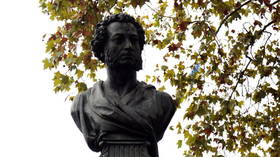Gandhi statue near Indian Embassy in US capital ‘desecrated’ by vandals amid ongoing police brutality protests (PHOTOS)
A statue of Indian independence leader Mahatma Gandhi has been defaced in the US capital, with vandals spray-painting obscenities on the monument as heated protests carry on in the city. Police have yet to identify the culprits.
Photos of the statue circulated on social media on Wednesday, some appearing to show the words “rapist” and “racist” scrawled on its base in bright orange paint. The DC Park Police have launched an investigation, though few other details were made public, according to ANI.
Walked by @IndianEmbassyUS staff reporting vandalism of #Gandhi statue to @DCPoliceDept about 20 minutes ago. Under the tarp overing the statue's base you can just make out "racist" spraypainted. Looks lile strategic troublemaking by #BlackLivesMatter opponents to me pic.twitter.com/WFDCaeSyem
— 🇪🇹🇺🇸🤙🏾ፍፁም (@fitsum) June 3, 2020
Seriously? Trashing a Ghandi statue?! pic.twitter.com/OeRY2uEk54
— Charlie Spies (@cspiesdc) June 3, 2020
Mahatma Gandhi’s statue outside the Indian Embassy in Washington DC desecrated by unruly elements of #BlackLivesMatter protesters. Sources tell ANI that United States Park Police have launched an investigation, more details awaited. pic.twitter.com/jxRpIhqd2W
— ANI (@ANI) June 4, 2020
While the motives for the vandalism remain unclear, critics of Gandhi have accused the Indian icon of being ignorant at best on the issues of racial and gender discrimination early in his life. Those who label Gandhi a “racist” often refer to an infamous quote in which he described black South Africans as “troublesome, very dirty and live like animals” back in 1903.
In the days before the statue was defaced, similar sentiments were echoed in social media posts by self-avowed Black Lives Matter activists, who have spearheaded protests around the country over police brutality over the last week.
While the remark Gandhi made in his early 20s still haunts his legacy, many argue that his beliefs on race were merely a sign of the times, pointing out that he eventually shed the stereotypes he expressed earlier in life.
Also on rt.com New Indian citizenship law fulfills wishes of Mahatma Gandhi & other freedom fighters – PM ModiIn an interview to NPR last year, the independence leader’s biographer, Ramachandra Guha, said that “as a young man,” Gandhi “went with the ideas of his culture and his time,” but later “outgrew his racism quite decisively, and for most of his life as a public figure, he was an anti-racist, talking for an end to discrimination of all kinds.”
Like this story? Share it with a friend!














